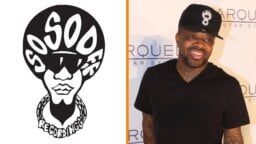WHAT’S HAPPENED?
K-pop giant HYBE has been added to an “anti-trust” list by the country’s economic competition regulator.
The Korea Fair Trade Commission (KFTC) announced on Wednesday (May 15) that HYBE is among five new corporations to be added to its list of “large corporate groups” that face closer monitoring by regulators and more rigorous financial transaction reporting rules, part of the South Korean government’s anti-trust regulations.
The KFTC said HYBE now has KRW 5.25 trillion (USD $3.86 billion) in total assets, above the KRW 5 trillion threshold for inclusion on the list.
HYBE is far and away the largest K-pop company in the country. Its assets include wholly-owned divisions like HYBE’s Weverse platform, majority-owned subsidiaries like Pledis Entertainment, and relatively recent overseas acquisitions, such as Scooter Braun’s Ithaca Holdings (now HYBE America), hip-hop label QC Media Holdings, and the recently established HYBE Latin America.
HYBE’s global expansion has been fueled by the massive success of its K-pop acts, which include the world’s biggest K-pop boy band, BTS, as well as the company’s debut on Korea’s stock market in 2020, which made HYBE founder and current Chair Bang Si-hyuk a billionaire and raised more than $800 million for the company.
HYBE’s inclusion on the KFTC’s list – by some accounts, the first entertainment company ever to make the list – doesn’t mean that it’s in any way run afoul of Korea’s anti-trust laws; the media’s use of the term “anti-trust” to describe the list refers to the fact the list is meant to prevent anti-competitive practices, rather than to identify companies engaged in them.
However, inclusion on the list does come with additional regulatory requirements that are not demanded of smaller companies.
Senior executives at the company will now be subject to heightened disclosure rules that include disclosing stock ownership by family members, up to the fourth degree of blood relation and third degree of relation by marriage.
Companies on the list are also assigned a “same person,” the term given for an individual who has effective control over the business. According to news reports, in HYBE’s case that person is Bang, with a 31.57% stake in the company. A company’s “same person” is subject to enhanced limitations on the trading of company stocks within their family.
The news brings up two key questions: Why does South Korea have different rules for its largest businesses? And how will this listing affect HYBE?
WHAT’S THE CONTEXT?
To understand the “five-trillion rule,” it helps to know something about how South Korea’s economy developed.
Seventy years ago, in the wake of the brutal Korean War, South Korea was a desperately poor country. A mountainous landmass physically cut off from the rest of Asia by a hostile North Korea, it had little in the way of natural resources to exploit to grow its economy. So it chose to emulate the success of another resource-poor country: Japan.
Like Japan, South Korea made human resources the center of its economy, educating its population and building an export-oriented economy. To facilitate that, the government encouraged the development of giant conglomerates known as chaebol.
The term chaebol means “rich family” or “financial clique,” and it aptly describes the nature of these economic conglomerates, which are often controlled by members of a single family, even when that company is publicly traded and the family are minority shareholders. Korean businesses have often been criticized for giving a tremendous amount of power to the founding family, at the expense of ordinary investors.
The chaebol were arguably a necessary part of South Korea’s growth strategy: they gave South Korean exports the scale, breadth, and capital needed to compete globally. Over time, they grew into true behemoths, exporting cars, household appliances, and electronics, among many other things. Some of the names of these giants may ring a bell: Hyundai, Samsung, LG.
It’s hard to understate the size of these businesses in the Korean context: Samsung, the largest chaebol, alone accounted for 17% of South Korea’s GDP in 2019.
Yet as Korea grew more affluent, the chaebol were increasingly seen by some in a negative light. They developed a reputation for bullying startups out of business, making it difficult to develop new businesses. And many blamed them for South Korea’s large gap between rich and poor.
While the country’s political environment has remained favorable to the large conglomerates, South Korea has nonetheless over the years developed anti-trust laws and established regulatory bodies designed to prevent the worst abuses of these companies’ dominant market positions – including the KFTC, which compiles the “anti-trust” list.
And in recent decades, South Korea has become a major exporter in another field: Entertainment, with both K-drama TV shows and K-pop making an ever-larger splash among global media consumers.
So perhaps it’s no surprise that, eventually, a K-pop company found itself surpassing the threshold for being listed by the KFTC.
COULD HYBE’S LISTING PUT IT AT A COMPETITIVE DISADVANTAGE AGAINST K-POP RIVALS?
As things stand, HYBE is the only K-pop company that even comes close to having the assets needed to be added to the KFTC’s anti-trust list.
HYBE’s largest rival, SM Entertainment, most recently reported assets of KRW 871 billion ($636 million), while YG Entertainment reported KRW 544 billion ($397 million) and JYP Entertainment claimed KRW 478 billion ($349 million), per the Korea Herald.
This means that, unless something drastically changes, HYBE could be alone among K-pop companies to be subject to enhanced disclosure requirements for a long time to come.
And that could create a potential competitive disadvantage for the company compared to its rivals. How much of a risk does that pose to HYBE? It’s hard to say, because, well, we don’t know what HYBE hasn’t disclosed. Yet short of some sort of disclosure that, for whatever reason, greatly harms HYBE’s reputation, the enhanced disclosure requirements are unlikely to have much impact.
In fact, HYBE’s addition to the list might actually be a benefit to the company, given that it highlights its rapid growth and formidable size. And it might benefit the entire K-pop industry, by creating the impression that the industry, once dominated by small firms, has now “entered the big time,” as it were.
“The recognition of a company as a conglomerate is an indicator that shows the growth potential and influence of the industry,” an unnamed industry source told the Korea Herald. “It means that the entertainment industry is developing, so HYBE’s latest designation has a significant value to it.”
It’s worth noting, also, that South Korea has another, even stricter, set of regulations for businesses with KRW 10 trillion or more in assets. This “10-trillion rule” goes beyond the regulations under the “five trillion rule,” most notably by limiting the ability of businesses on that list to engage in cross-ownership of other publicly traded companies.
If HYBE were to cross that threshold, it could limit the sorts of deals it engages in as the company grows. While it wouldn’t affect non-publicly-traded subsidiaries like HYBE America or HYBE Latin America, it could make it more difficult to engage in deals such as HYBE’s (unsuccessful) attempt last year to take control of SM Entertainment.
A FINAL THOUGHT…
It’s an open question whether South Korea’s “five-trillion rule” was meant to capture a company like HYBE.
Strictly speaking, HYBE isn’t a chaebol – it isn’t a conglomerate with its hands in numerous different areas of commerce, and with outsized influence over South Korea’s economy.
With 12 record labels under its control, HYBE is largely a music company. And though its board is headed up by its founder, Bang (who is no longer CEO), its other largest individual shareholders are Scooter Braun and the seven members of BTS – hardly a family-controlled cartel.
The KFTC itself appears to have come to the realization that the five-trillion rule may be catching too many businesses in its net, and is currently rethinking the threshold for inclusion on the anti-trust list.
The 5 trillion number was established back in 2009, and since then, the world has seen a considerable amount of asset price inflation. This means the number of businesses falling within the five-trillion threshold is rising rapidly, growing from 49 companies in 2009 to 88 in the new list for 2024.
According to Business Korea, the KFTC is considering changing the threshold so that, rather than being a set number that doesn’t change from year to year, the threshold would be set as a percentage of South Korea’s GDP, meaning that as the economy grows, so too would the threshold for inclusion on the list.
The KFTC is deliberating setting the asset threshold at either 0.3% of GDP – meaning KRW 6.5 trillion, at the country’s current GDP – or 0.25%, meaning KRW 5.4 trillion. In both cases, HYBE would fall below the threshold for inclusion on the anti-trust list – though, given its rapid growth, perhaps not for long.
But in the meantime, the KFTC continues to defend its practice of compiling the list, even as questions arise about whether the list is a sign that South Korean businesses are over-regulated.
“The designation system exists to prevent owner families from bolstering their excessive, and possibly dubious control over a company and to curb any unfair internal transactions,” KFTC Chair Han Ki-jeong said on Wednesday, as quoted by Korea JoongAng Daily.
“If [such issues] are resolved, we will be able to discuss the abolition of the system, but at this point, the issues still remain.”Music Business Worldwide







